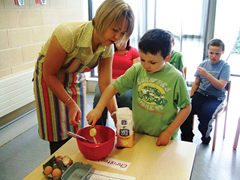Linking businesses and schools
 Volunteering in schools can improve results for children and help deprived communities value education more highly. Peter Cheney outlines some of the opportunities available.
Volunteering in schools can improve results for children and help deprived communities value education more highly. Peter Cheney outlines some of the opportunities available.
Education has traditionally been a major focus for corporate social responsibility. Connections between businesses and further and higher education are well developed. However, practical and financial support from the private sector can also make a difference much earlier in a child’s education.
The vast majority of school education in Northern Ireland is state-funded but the mainstream schools budget is facing major cuts over this Assembly term. Inflation is pushing up the costs of running buildings, providing transport and buying materials.
Integrated education has received substantial support from businesses in recent years. Grant-maintained integrated schools are established through an initial investment by parents and other benefactors.
The integrated sector, though, accounts for just 6.4 per cent of the school population and the controlled and Catholic maintained sectors point out that they quietly promote good relations. These schools often have to fund cross-community links from their own budgets but some have received extra support through the Sharing Education Programme, funded by Atlantic Philanthropies.
At an everyday level, volunteering in schools helps to give children good role models, especially in deprived and divided neighbourhoods. agendaNi’s education report last October (issue 58) highlighted how businesspeople can help on boards of governors and also in the classroom.
For Christine Harper and Sean McArdle, serving as governors has helped them to share their business expertise with teaching staff. The Department of Education is keen to bring “enthusiastic and committed” people from all walks of life on to boards of governors.
“Many governors find this a challenging yet rewarding role which enables them to make a contribution to the community, children and young people,” said a spokeswoman. “Boards of governors are reconstituted every four years although new applications are welcome anytime to fill vacancies that arise due to mid-term resignations.”
The community use of schools, as happens in the Girls Model in North Belfast, is another example. Companies can run training courses by using its IT facilities and night classes provide adult education and help parents take up new interests.
Suzanne Marcus, a teacher in nearby Wheatfield Primary School, wants to see businesses, churches and community groups becoming more involved in schools. Volunteers can come in and help with reading partnerships, which involve one-to-one reading with a child for three 15-minute slots each week. Through this work, her school has seen the reading ages of some children increase by two years over six months.
“I never doubt that our parents want the best for their children,” she said. “However, many of them don’t have access to a strong support network and are often bringing up their children alone. We, as a school, are eager to support them in whatever ways we can.”





